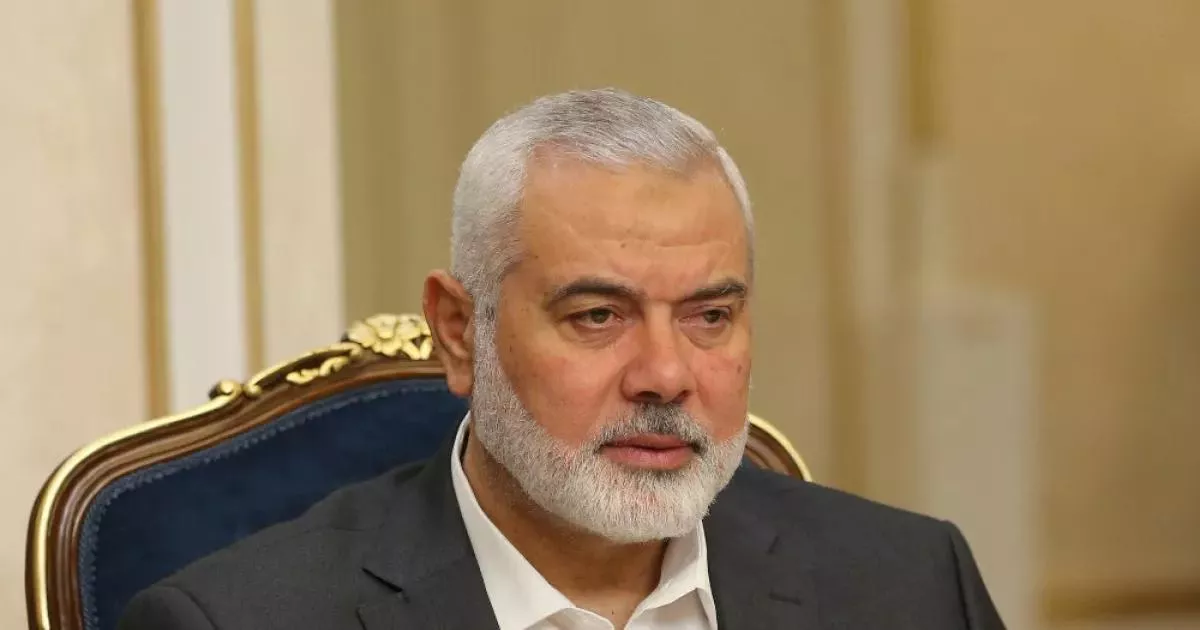"Ismail Haniyeh was a prominent Palestinian politician and the leader of Hamas, the governing body of the Gaza Strip since 2007. As the chairman of Hamas' political bureau, he held significant influence. In 2023, he relocated to Qatar, where he resided until his assassination in Iran on July 31, 2024."
1948: Haniyeh's family flees to Gaza Strip
In 1948, Ismail Haniyeh's parents, originally from what is now Ashkelon, fled to the Gaza Strip during the 1948 Arab–Israeli War and Palestinian expulsion and flight.
January 1962: Ismail Haniyeh is born
Ismail Haniyeh was born in January 1962 in the al-Shati refugee camp in the Egyptian-occupied Gaza Strip.
1962: Haniyeh is born in Gaza Strip
In 1962, Ismail Haniyeh was born in the al-Shati refugee camp in the Egyptian-occupied Gaza Strip.
1967: Haniyeh proposes Palestinian state within 1967 borders
In his letter to US president Bush, Ismail Haniyeh offered a long-term truce with Israel while accepting a Palestinian state within the 1967 borders.
1985: Haniyeh leads student council
From 1985 to 1986, Ismail Haniyeh was head of the students' council representing the Muslim Brotherhood at the Islamic University of Gaza.
1986: Haniyeh leads student council
From 1985 to 1986, Ismail Haniyeh was head of the students' council representing the Muslim Brotherhood at the Islamic University of Gaza.
1987: Haniyeh graduates from Islamic University of Gaza
Ismail Haniyeh graduated from the Islamic University of Gaza with a degree in Arabic literature in 1987.
1989: Haniyeh imprisoned by Israel for three years
In 1989, Ismail Haniyeh was imprisoned by Israel for three years.
1997: Haniyeh appointed to head Yassin's office
After Israel released Ahmed Yassin from prison in 1997, Ismail Haniyeh was appointed to head his office.
2003: Haniyeh injured in Israeli Air Force attack
Following a suicide bombing in Jerusalem in 2003, Ismail Haniyeh was slightly injured by an Israeli Air Force bomb attack that attempted to eliminate the Hamas leadership.
December 2005: Haniyeh elected to head the Hamas list
In December 2005, Ismail Haniyeh was elected to head the Hamas list for the Palestinian legislative elections.
January 2006: Hamas wins Palestinian legislative elections
The Hamas "List of Change and Reform" won the Palestinian legislative elections on January 25, 2006.
February 2006: Haniyeh nominated as prime minister
Ismail Haniyeh was nominated as prime minister on February 16, 2006, following Hamas' victory in the Palestinian legislative elections.
March 2006: Haniyeh sworn in as prime minister
Ismail Haniyeh was sworn in as prime minister on March 29, 2006.
August 2006: Haniyeh states refusal to recognize Israel and continued commitment to "jihad-like movement"
In August 2006, during his first trip abroad as prime minister, Haniyeh visited Iran and declared that Hamas would never recognize Israel. He emphasized their commitment to a "jihad-like movement" until the liberation of Jerusalem.
October 2006: Haniyeh's convoy attacked
On October 20, 2006, on the eve of a deal to end fighting between Fatah and Hamas, Ismail Haniyeh's convoy came under gunfire in Gaza. Haniyeh was not hurt.
December 2006: Haniyeh denied entry to Gaza
On December 14, 2006, Ismail Haniyeh was denied entry to Gaza from Egypt at the Rafah Border Crossing.
2006: Haniyeh criticizes Pope Benedict XVI's remarks on Islam
During the Pope Benedict XVI Islam controversy in 2006, Haniyeh expressed strong objections to the Pope's comments. He condemned the remarks, stating that they contradicted the truth and offended Muslims. Haniyeh also denounced the Palestinian attacks on churches in the West Bank and Gaza.
2006: Haniyeh becomes Prime Minister of the State of Palestine
Following Hamas' victory in the 2006 Palestinian legislative elections, Ismail Haniyeh became Prime Minister of the State of Palestine.
2006: Haniyeh leads Hamas in Gaza Strip
From 2006 until February 2017, Ismail Haniyeh was the leader of Hamas in the Gaza Strip.
2006: Haniyeh sends letter to US President Bush
Several months after Hamas' 2006 election victory, Ismail Haniyeh sent a letter to US President Bush calling for direct negotiations with the elected Palestinian government, offering a long-term truce with Israel, and urging an end to the international boycott.
February 2007: Haniyeh resigns as part of national unity government formation
On February 15, 2007, Ismail Haniyeh resigned as prime minister as part of the process to form a national unity government between Hamas and Fatah.
March 2007: Unity government formed
A Palestinian unity government was formed in March of 2007.
March 2007: Haniyeh forms new government
On March 18, 2007, Ismail Haniyeh formed a new Palestinian government that included both Fatah and Hamas politicians.
June 2007: Abbas dismisses Haniyeh as Prime Minister
On June 14, 2007, Mahmoud Abbas, the President of the Palestinian National Authority, dismissed Ismail Haniyeh from office. Haniyeh did not acknowledge the decree.
June 2007: Abbas dismisses unity government and Haniyeh
On June 14, 2007, amid the Battle of Gaza, president Mahmoud Abbas announced the dissolution of the March 2007 unity government, dismissed Ismail Haniyeh, and declared a state of emergency.
2007: Hamas takes control of Gaza Strip
In 2007, Hamas, the Palestinian political organization led by Ismail Haniyeh, took control of the Gaza Strip.
December 2010: Haniyeh expresses conditional acceptance of a Palestinian state
In December 2010, during a news conference in Gaza, Haniyeh indicated a conditional acceptance of a Palestinian state within the 1967 borders, with Jerusalem as its capital. He also called for the release of Palestinian prisoners and a resolution to the refugee issue. Haniyeh suggested that if the Palestinian electorate approved such a peace agreement with Israel, his government would honor it despite Hamas's previous stance.
May 2011: Haniyeh mourns Osama bin Laden's death, drawing criticism from the US
On May 2, 2011, following the death of Osama bin Laden at the hands of US forces, Haniyeh sparked controversy by referring to bin Laden as an "Arab holy warrior" and condemning his killing. While Hamas's rival Fatah praised the US operation, Haniyeh's remarks, perceived as an attempt to appease Al-Qaeda-inspired groups in Gaza, drew sharp criticism from the United States government.
2012: Haniyeh's Sister and Husband Receive Medical Treatment in Israel
In early 2012, Israeli authorities granted permission for Ismail Haniyeh's sister, Suhila Abd el‑Salam Ahmed Haniyeh, and her critically ill husband to travel to Israel for emergency heart treatment that was unavailable in Gaza. They received successful treatment at the Rabin Medical Center in Petah Tikva, Israel and returned to Gaza.
November 2013: Haniyeh's Granddaughter Treated in Israel
In November 2013, Ismail Haniyeh's granddaughter received medical treatment in an Israeli hospital.
March 2014: Haniyeh reiterates refusal to recognize Israel and condemns Gaza blockade
On March 23, 2014, during an event commemorating the tenth anniversary of Sheik Ahmad Yassin's assassination, Haniyeh addressed a crowd of Hamas supporters. He reiterated Hamas's refusal to recognize Israel and condemned the tightening blockade on Gaza. The crowd responded with chants expressing support for Hamas and advocating for attacks on Tel Aviv.
June 2014: Haniyeh's government resigns
In June 2014, Haniyeh's government resigned. This event would later be cited by Hamas members of parliament as a turning point in the relationship between Hamas and Fatah.
June 2014: Haniyeh's Mother-in-Law Receives Medical Treatment in Israel
Ismail Haniyeh's mother-in-law received medical treatment in an Israeli hospital in June 2014.
September 2016: Haniyeh Makes Pilgrimage to Mecca
In September 2016, Ismail Haniyeh, his wife, and two of his sons embarked on the annual Hajj pilgrimage to Mecca. This trip was widely seen as the start of his campaign to succeed Khaled Mashaal as leader of Hamas.
October 2016: Palestinian Legislative Council endorses return of Haniyeh's government
On October 2016, the Legal Committee of the Palestinian Legislative Council (PLC) endorsed a request for the return of Haniyeh's government to the Gaza Strip, following its resignation in June 2014. The endorsement came after Hamas members of parliament submitted a study criticizing the government's performance since Haniyeh's resignation. Hamas argued that the consensus government had reneged on agreements made with the Palestine Liberation Organization, effectively becoming a Fatah government. Despite the PLC recommendation, both the consensus government and Fatah rejected the request, citing its illegality and potential for further division between Gaza and the West Bank.
November 2016: Haniyeh poised to succeed Khaled Mashaal as leader of Hamas
In November 2016, reports emerged suggesting that Haniyeh was likely to succeed Khaled Mashaal as the leader of Hamas. The speculation followed a meeting between Mashaal, Haniyeh, and Palestinian President Mahmoud Abbas in Qatar to discuss national reconciliation and upcoming elections. The meeting indicated that Haniyeh was favored over other potential candidates, including Moussa Mohammed Abu Marzook and Mahmoud Zahhar.
2016: Haniyeh relocates to Qatar
Around 2016, Ismail Haniyeh relocated from Gaza to Qatar, where he maintained an office in Doha.
2016: Haniyeh succeeds Mashaal as head of Hamas
In 2016, Ismail Haniyeh succeeded Khaled Mashaal as head of Hamas in an election.
February 2017: Sinwar replaces Haniyeh as Hamas leader in Gaza Strip
In February 2017, Yahya Sinwar replaced Ismail Haniyeh as the leader of Hamas in the Gaza Strip.
2018: Haniyeh designated as a global terrorist by the United States
In 2018, the United States added Ismail Haniyeh to its list of Specially Designated Global Terrorists.
February 2020: Haniyeh meets with Turkish President Erdoğan, sparking criticism from the US State Department
In February 2020, Haniyeh met with Turkish President Recep Tayyip Erdoğan. The meeting drew criticism from the U.S. State Department, which stated that Erdoğan's continued outreach to Hamas isolated Turkey internationally, harmed Palestinian interests, and undermined efforts to prevent terrorist attacks from Gaza.
August 2020: Haniyeh and Abbas reject Israel-UAE normalization agreement
In August 2020, Haniyeh initiated a phone call with Mahmoud Abbas to express their joint rejection of the normalization agreement established between Israel and the United Arab Emirates. This rare display of unity between the two leaders underscored their shared stance on the issue.
2020: Haniyeh Attends Qassim Suleimani's Funeral
Ismail Haniyeh attended the funeral of Qassim Suleimani, an Iranian general, in Tehran, Iran in 2020.
October 2023: Israeli Airstrike Kills Fourteen Members of Haniyeh's Family
In October 2023, an Israeli airstrike targeted Ismail Haniyeh's family home in Gaza City, resulting in the deaths of fourteen family members, including his brother and nephew.
October 2023: Haniyeh leaves Turkey and meets with Iranian Foreign Minister in Doha
On October 15, 2023, unconfirmed reports suggested that Haniyeh had left Turkey. While Turkey officially denied these reports, Haniyeh subsequently met with Iranian Foreign Minister Hossein Amir-Abdollahian in Doha, Qatar.
October 2023: Haniyeh delivers televised address on the day of the Hamas attack on Israel
On October 7, 2023, coinciding with the Hamas attack on Israel, Haniyeh delivered a televised address from Istanbul, Turkey. He cited threats to Al-Aqsa mosque, the Israeli blockade of Gaza, and the plight of Palestinian refugees as justifications for the attack. He questioned Israel's ability to protect itself or other Arab countries and dismissed the effectiveness of normalization agreements in resolving the Palestinian conflict.
October 2023: Haniyeh discusses hostage release and Israel-Hamas war with Turkish officials
Throughout October 2023, Haniyeh engaged in discussions with Turkish officials regarding the ongoing Israel-Hamas war. On October 16, he spoke with Turkey's Foreign Minister, Hakan Fidan, about the potential release of hostages taken during the Hamas attack. Later, on October 21, he conferred with Turkish President Recep Tayyip Erdoğan to address the latest developments in the conflict and the situation in Gaza.
November 2023: Haniyeh's Granddaughter and Grandson Killed in Separate Israeli Airstrikes
In November 2023, tragedy struck Ismail Haniyeh's family again when his granddaughter was reportedly killed in an Israeli airstrike in Gaza City. Later that same month, his eldest grandson was also killed in a separate Israeli airstrike.
November 2023: Haniyeh condemns Israeli attack on Jabalia refugee camp, vows continued fighting
On November 1, 2023, following an Israeli attack on the Jabalia refugee camp targeting Hamas member Ibrahim Biari, Haniyeh accused Israel of carrying out "barbaric massacres against unarmed civilians." He asserted that the fighting would persist until Palestinians achieve their "legitimate rights to freedom, independence, and return."
November 2023: Haniyeh expresses willingness for political negotiations under certain conditions
On November 2, 2023, Haniyeh stated that Hamas was prepared to engage in political negotiations for a two-state solution, with Jerusalem as the capital of Palestine, if Israel agreed to a ceasefire and the opening of humanitarian corridors to Gaza. He emphasized that the Israeli captives were subject to the same dangers as the Palestinian people.
April 2024: Three of Haniyeh's Sons and Three Grandchildren Killed in Israeli Airstrike
On April 10, 2024, three of Ismail Haniyeh's sons and three of his grandchildren were killed in an Israeli airstrike in the Gaza Strip.
May 2024: International Criminal Court prosecutor requests arrest warrant for Haniyeh
On May 20, 2024, International Criminal Court (ICC) prosecutor Karim Khan requested an arrest warrant for Haniyeh, along with other Palestinian and Israeli leaders, as part of an investigation into war crimes and crimes against humanity committed during the Israel-Hamas war.
June 2024: Ten Members of Haniyeh's Family Killed in Israeli Airstrike
On June 25, 2024, ten members of Ismail Haniyeh's family, including his 80-year-old sister, were killed in an Israeli airstrike on the al-Shati refugee camp.
July 2024: Haniyeh killed in Iran
On July 31, 2024, Iranian media reported that Ismail Haniyeh had been killed during a visit to Iran.
July 2024: Iranian Media Reports Haniyeh's Assassination
On July 31, 2024, Iranian state media reported the assassination of Ismail Haniyeh in Iran. He was reportedly in Iran to attend the inauguration of president-elect Masoud Pezeshkian.
Mentioned in this timeline
Qatar is a country located on the Qatar Peninsula in...

Osama bin Laden was the founder and leader of al-Qaeda...

News encompasses information about current events disseminated through various media...
Hamas is a Sunni Islamist Palestinian nationalist political organization with...
Lebanon is a country in the Levant region of West...
Turkey officially the Republic of T rkiye is a transcontinental...
Trending

2 hours ago MAC eyes Sacramento State football addition amid financial debate and conference realignment.
2 hours ago Quentin Halys Rallies to Victory in Rotterdam ATP 500 Tournament Against Rottgering

3 hours ago Sidney Crosby Captans Team Canada, Passing Torch to McDavid for 2026 Olympics.
4 hours ago Hailey Baptiste in Dubai 2026; Kasatkina Discusses Olympics and Figure Skating.

5 hours ago Dustin Hoffman joins Adam Sandler in Netflix's 'Time Out' remake cast.

5 hours ago Peggy Fleming's 1968 Olympic Gold: A Nation's Hope and Skating Legend Revisited.
Popular

Kid Rock born Robert James Ritchie is an American musician...
The Winter Olympic Games a major international multi-sport event held...

Pam Bondi is an American attorney lobbyist and politician currently...

Barack Obama the th U S President - was the...

XXXTentacion born Jahseh Dwayne Ricardo Onfroy was a controversial yet...

Michelle Obama is an American attorney author and former First...
